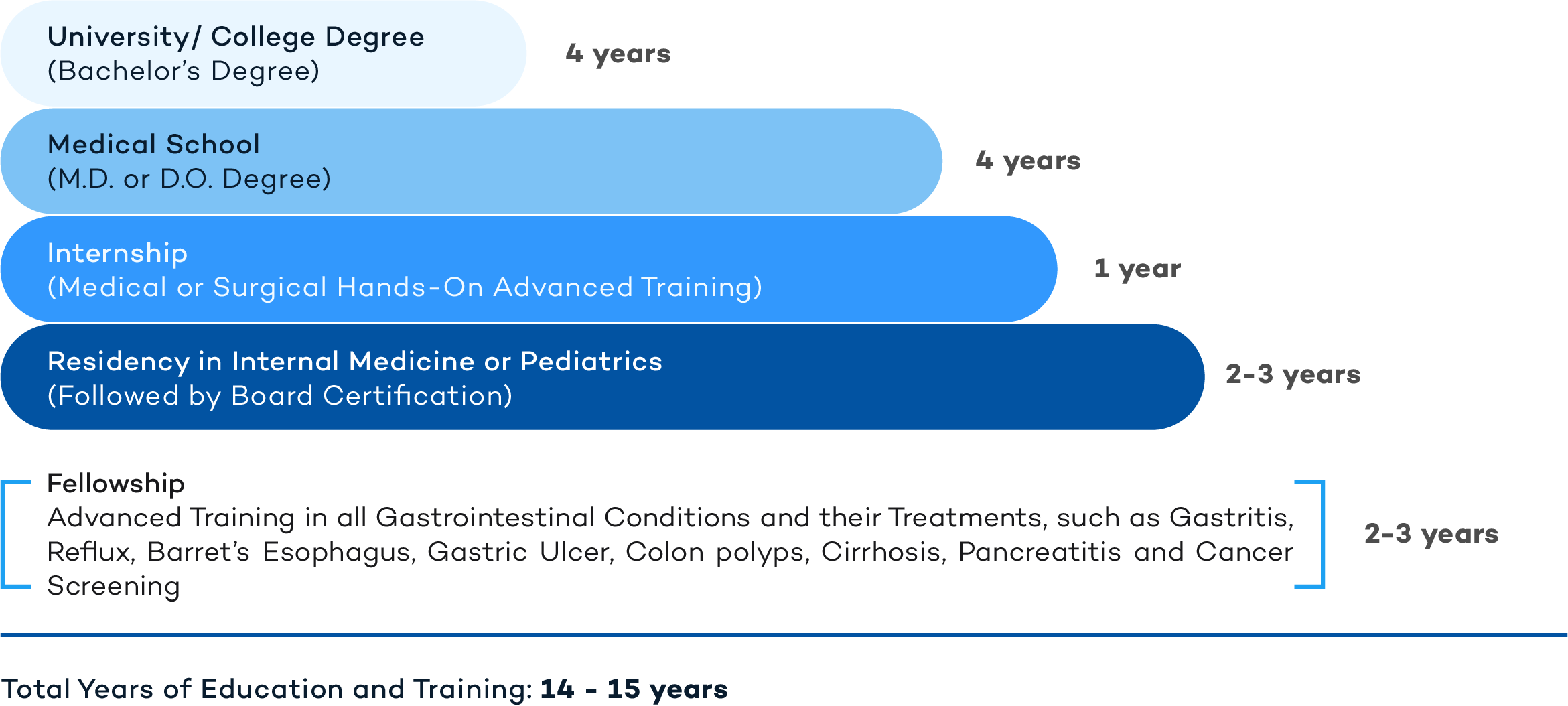

A Gastroenterologist is a Board-Certified Doctor who treats and diagnoses diseases of the gastrointestinal tract and liver, focusing on: the digestive or gastrointestinal (GI) tract, including the process during which food moves through the digestive system, the absorption of nutrients, and the excretion of waste. Gastroenterologists can perform surgeries, procedures such as endoscopies and colonoscopies, and dispense medications.
The level of expertise to treat a specific condition and the credentials are important factors when choosing the right physician. You may do your diligence and check the credentials and practice style of the doctor with the help of your family and friends. At myDoqter, we are introducing a new way to get acquainted with the doctor and his/her expertise. We facilitate this process by providing you with access to the professional recommendations given by other physicians who have witnessed first-hand the expertise and professional competency of your Gastroenterologist.
Gastroenterologists are doctors (M.D. or D.O.) with advanced medical degrees and training. The following is a representation of the years of education and training that a Gastroenterologist has undergone.

GASTRO from the Greek word ‘gaster’ for ‘stomach’ and ENTERO from the Greek word ‘entero’ for ‘intestine’ + LOGY from the Greek word ‘logia’ which means ‘logic’ or ‘the study of’.
A Gastroenterologist will treat an extensive list of gastrointestinal tract and liver-related conditions, including:
Gastroesophageal Reflux Disease (GERD): This is given by the backflow of stomach’s content back into the esophagus, causing irritation of the lining of the esophagus. Symptoms of GERD include: a burning sensation in your chest, chest pain or discomfort that worsens when you lie down, a bitter taste in your throat and difficulty swallowing. Factors that lead to GERD or heartburn include: being overweight, smoking, and eating spicy, fatty or fried food. Stomach acid can harm the esophagus and potentially lead to a condition known as Barrett’s Esophagus, which may lead to a potentially fatal form of cancer of the esophagus.
Barret’s Esophagus: The esophagus is the tube-like structure between the mouth and the stomach. Food enters the esophagus after being chewed and swallowed, and food is transported through it and delivered to the stomach for digestion. Transformation of the lining of the esophagus as a result of acid reflux can lead to Barret’s esophagus. Patients suffering from Barret’s Esophagus have an increased risk of cancer of the esophagus.
Gastritis and Gastric Ulcer: High levels of stomach acid may lead to irritation and erosion of the lining of the stomach. If severe, a stomach ulcer may develop. Several factors may either cause or worsen gastritis and gastric ulcers. These include:
Typical symptoms of gastritis and gastric ulcers include: upper and mid abdominal pain, weakness, nausea, loss of appetite, weight loss, fatigue, vomiting of blood and dark colored stools (from processing of blood that is bled from the stomach and transits through the intestines). Advanced cases of gastric ulcers may lead to gastric cancer.
Pancreatitis: This is given by the infection or inflammation of the pancreas. This is a very important organ that releases powerful digestive enzymes into the small intestine to help us digest our food. It also secretes insulin and glucagon, two important hormones that help to regulate blood sugar levels. Factors that may lead to pancreatitis include:
Symptoms of pancreatitis include nausea, vomiting, abdominal pain, diarrhea, and weakness. This condition may be become severe in some situations, present with severe abdominal pain, fever and multiple organs affected such as the heart and, lungs and kidnesy, and leading to hospitalization.
Gallstones: These are hard deposits forming in the gallbladder and blocking the gallbladder ducts. They are due to either excess cholesterol content in the bile that leads to the bile hardening and forming these stone-like deposits (80% of cases). Factors that cause or worsen gallstones include:
Symptoms can include sudden and intensifying pain in the right upper side of the abdomen, cramping, indigestion, nausea and vomiting.
Cirrhosis: This is the scarring and irreversible damage to the liver caused by long-term exposure to toxins, such as viral infections (Hepatitis C most commonly) or chronic alcohol use. A damaged liver interferes with the ability of the body to filter toxins from the blood. Symptoms may include abdominal pain, nausea, fatigue, loss of appetite, weight loss, yellowing of the skin (jaundice), dark or black stools, swelling of the legs, ankles and feet, among others.
Celiac Disease: It is given by increased sensitivity to gluten, a protein commonly found in barley, rye, and wheat. Gluten will activate a self-destructive immune response, directed mainly at the gastrointestinal track, but that can affect other organs. Symptoms include: belching, diarrhea, fat in stools, lactose intolerance, flatulence, abdominal cramping, skin rash, weight loss, delayed puberty and slow growth in the case of children.
Irritable Bowel Syndrome (IBS): This consists of a variety of symptoms occurring together and affecting the large intestine. IBS may develop after a significant episode of diarrhea (gastroenteritis), or may be due to an excess of bacteria in the gastrointestinal tract (bacterial overgrowth). Symptoms include: constipation, diarrhea, abdominal pain, cramps, flatulence, loss of appetite, anxiety and depression.
Hemorrhoids: These are painfully swollen and inflamed veins in the lower part of the anus and rectum. If the patient suffers from constipation, then hemorrhoids may be more likely to happen over time.
Colorectal Cancer: This cancer starts in the colon and/or rectum. It may develop from a premalignant polyp in many cases. Polyps are growths that develop in the colon in some patients. They can be detected and removed during a standard screening Colonoscopy.
Ultimately, Prevention is the most important step towards maintaining the health of your gastrointestinal tract and your liver. The American Gastroenterological Association (AGA) recommends screening for colorectal cancer beginning at an age no later than 50. The screening consists of a Colonoscopy, which is an outpatient, non-surgical procedure that is performed by your gastroenterologist. During the colonoscopy, your doctor will be able to see the internal surface of your colon and rectum, and detect and remove any early small cancers, such as premalignant or malignant polyps. When you visit your Gastroenterologist, you will also receive important information regarding how to prevent the development or worsening of gastrointestinal tract conditions, as well as how to prevent liver damage. Important recommendations to promote good gastrointestinal health include:
Your Gastroenterologist is trained to offer a wide range of treatment options that are tailored to your specific condition. Your physician will work with you to find the best-personalized treatment choice and approach, and will discuss alternative options.
You can read more about Gastroenterology in the following links:
https://gi.org/patients/gi-health-and-disease/
https://gi.org/patients/gi-health-and-disease/what-is-a-gastroenterologist
https://gi.org/patients/brochures/